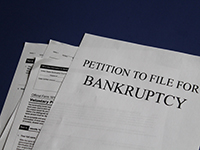
Filing for bankruptcy can be an overwhelming process. That said, you can make it easier for you by hiring a bankruptcy lawyer in MA.
A bankruptcy lawyer in MA is knowledgeable of the ins and outs of the legal system. Whether you are filing for Chapter 13 bankruptcy or working on your Chapter 7 case, you can rely on Massachusetts bankruptcy lawyers, such as the ones at Riley & Dever, for professional assistance.
What Is Bankruptcy and Why Should You Contact a Massachusetts Bankruptcy Attorney for Your Bankruptcy Needs in MA and Boston?
Bankruptcy refers to a legal status for which individuals and businesses may both file with assistance from a Massachusetts bankruptcy lawyer. Typically, individual debtors would file for bankruptcy when they have reached a point where they are no longer able to repay their debts.
Common types of bankruptcy for individual debtors include Chapter 13 bankruptcy, which involves a structured repayment program, and Chapter 7 bankruptcy, which requires debtors to liquidate assets to cover their debts. If you do not have experience in navigating these legal intricacies, the best course of action is to hire a qualified bankruptcy lawyer in MA. Learn more about Massachusetts bankruptcy here.
Benefits of Hiring a Lawyer That Specializes in Bankruptcy Law

A bankruptcy lawyer in MA can help alleviate the stress of filing for bankruptcy so that you can focus on the most important matters of your life: family, employment, and work or school. That is just one of the many benefits to enlisting the help of a bankruptcy lawyer in MA. Here are more of the reasons why you should work with a bankruptcy lawyer in MA:
A seasoned bankruptcy lawyer has years of experience under his or her belt.
Working with a bankruptcy lawyer in MA is a smart decision given that bankruptcy law can be complicated. Bankruptcy proceedings often require that you are familiar with both federal and state law. In addition, bankruptcy cases may involve extensive paperwork and a detailed report of your liabilities and assets.
Since a bankruptcy lawyer in MA understands the rules and regulations of bankruptcy paperwork and statutory filing requirements, enlisting his or her service can make your case proceed smoothly and efficiently. This bankruptcy lawyer in MA will also see to it that you complete your paperwork correctly and avoid any mistake that can compromise your rights and interests.
They can offer bankruptcy legal representation service.
 When you file for bankruptcy, you’ll have to communicate with creditors, negotiations, and settlements and learn all the specifics of court proceedings. Some filers may feel uncomfortable making these calls and connections, which is where a bankruptcy lawyer in MA can step in and provide aid.
When you file for bankruptcy, you’ll have to communicate with creditors, negotiations, and settlements and learn all the specifics of court proceedings. Some filers may feel uncomfortable making these calls and connections, which is where a bankruptcy lawyer in MA can step in and provide aid.
A bankruptcy lawyer in MA can handle these communications on your behalf, knowing the appropriate information to disclose. A bankruptcy lawyer in MA can also represent you in court proceedings and meetings.
Besides, the United States Federal Judiciary may require you to retain a bankruptcy lawyer in MA when filing for bankruptcy. This leaves some people no choice but to work with a bankruptcy lawyer in MA, which is also for their own benefit and safety.
They can help you with insurance
 A Massachusetts bankruptcy attorney typically carries malpractice insurance. This means that if a Massachusetts bankruptcy attorney makes a mistake on a bankruptcy case, the filer he or she is representing may be entitled to compensation for his or her losses.
A Massachusetts bankruptcy attorney typically carries malpractice insurance. This means that if a Massachusetts bankruptcy attorney makes a mistake on a bankruptcy case, the filer he or she is representing may be entitled to compensation for his or her losses.
This is not the case for pro se filers or those who file for bankruptcy without help from a bankruptcy lawyer in MA. In other words, working with a Massachusetts bankruptcy attorney can provide you with an added level of security.
They offer professional courtesy
 Unlike some pro se filers, a Massachusetts bankruptcy attorney has connections with clerks, judges, fellow Massachusetts bankruptcy lawyers, and other parties in their clients’ case. Additionally, they have extensive knowledge of the workings of the court.
Unlike some pro se filers, a Massachusetts bankruptcy attorney has connections with clerks, judges, fellow Massachusetts bankruptcy lawyers, and other parties in their clients’ case. Additionally, they have extensive knowledge of the workings of the court.
The connections of a bankruptcy lawyer in MA do not automatically give him or her any legal advantage over a pro se filer. However, these connections of Massachusetts bankruptcy lawyers can help keep clients’ cases moving through the system.
They can help keep you from making costly mistakes.
Failing to file for bankruptcy correctly can lead to the trustee throwing you out your case. If this happens, you may not be able to file for any type of bankruptcy in the near future because it is simply not worth the risk. Enlisting the help of a bankruptcy lawyer in MA will help you avoid any potential damage to your bankruptcy case and finances.
History of Bankruptcy
 In Ancient Greece, there was no such thing as bankruptcy. Instead, if a man couldn’t repay a debt, his entire family would be forced into what is known as debt slavery. This slavery lasted until the creditor felt that they were compensated for losses through physical labour. Debt slavery was often capped at a five years period. Nonetheless, servants of the debtor could be held past that cutoff time by the loan boss and were regularly compelled to serve their new master for a lifetime, for the most part under altogether harsher conditions. A special case to this standard was Athens, which by the laws of Solon precluded oppression for obligation; as a result, most Athenian slaves were outsider.
In Ancient Greece, there was no such thing as bankruptcy. Instead, if a man couldn’t repay a debt, his entire family would be forced into what is known as debt slavery. This slavery lasted until the creditor felt that they were compensated for losses through physical labour. Debt slavery was often capped at a five years period. Nonetheless, servants of the debtor could be held past that cutoff time by the loan boss and were regularly compelled to serve their new master for a lifetime, for the most part under altogether harsher conditions. A special case to this standard was Athens, which by the laws of Solon precluded oppression for obligation; as a result, most Athenian slaves were outsider.
The Statute of Bankrupts of 1542 was the main resolution under English law managing chapter 11 or indebtedness. Insolvency is additionally recorded in East Asia. Under the reign of Genghis Khan contained an arrangement that ordered capital punishment for any individual who became bankrupt multiple times.
Bankruptcy Attorney Massachusetts : Bankruptcy in the United States
 Chapter 11 in the United States is an issue set under government purview by the United States Constitution, which engages Congress to sanction “uniform Laws regarding the matter of Bankruptcies all through the United States”. Congress has ordered resolutions administering liquidation, essentially as the Bankruptcy Code, situated at Title 11 of the United States Code.
Chapter 11 in the United States is an issue set under government purview by the United States Constitution, which engages Congress to sanction “uniform Laws regarding the matter of Bankruptcies all through the United States”. Congress has ordered resolutions administering liquidation, essentially as the Bankruptcy Code, situated at Title 11 of the United States Code.
An account holder goes into chapter 11 to acquire alleviation from obligation, and this is ordinarily practiced either through a release of the obligation or through a rebuilding of the obligation. At the point when an account holder documents a willful appeal, their insolvency case initiates.
Bankruptcy Debts & Exemptions
 While chapter 11 cases are constantly documented in the United States Bankruptcy Court, liquidation cases, especially regarding the legitimacy of cases and exceptions, are regularly needy upon State law. A Bankruptcy Exemption characterizes the property a borrower may hold and safeguard through liquidation. Certain genuine and individual property can be excluded on “Calendar C” of an account holder’s liquidation structures, and successfully be taken outside the indebted person’s chapter 11 home. Insolvency exceptions are accessible just to people seeking financial protection.
While chapter 11 cases are constantly documented in the United States Bankruptcy Court, liquidation cases, especially regarding the legitimacy of cases and exceptions, are regularly needy upon State law. A Bankruptcy Exemption characterizes the property a borrower may hold and safeguard through liquidation. Certain genuine and individual property can be excluded on “Calendar C” of an account holder’s liquidation structures, and successfully be taken outside the indebted person’s chapter 11 home. Insolvency exceptions are accessible just to people seeking financial protection.
There are two elective frameworks that can be utilized to “absolved” property from an insolvency home, government exceptions, and state exclusions. For instance, Maryland and Virginia, which are abutting states, have diverse individual exclusion sums that can’t be seized for installment of obligations. This sum is the first $6,000 in property or money in Maryland, however regularly just the first $5,000 in Virginia. State law in this manner assumes a significant job in numerous chapter 11 cases, with the end goal that there might be noteworthy contrasts in the result of an insolvency case contingent on the state in which it is recorded.
After an insolvency request is documented, the court plans a conference assembled a 341 conference or meeting of loan bosses, at which the chapter 11 trustee and banks survey the candidate’s appeal and supporting timetables, question the solicitor, and can challenge exceptions they accept are ill-advised.
Massachusetts Bankruptcy : Chapters of Bankruptcy
 There are six types of bankruptcy that can be found under Title 11 of the United States Bankruptcy Code:
There are six types of bankruptcy that can be found under Title 11 of the United States Bankruptcy Code:
- Chapter 7: basic liquidation for individuals and businesses; also known as straight bankruptcy; it is the simplest and quickest form of bankruptcy available
- Chapter 9: municipal bankruptcy; a federal mechanism for the resolution of municipal debts
- Chapter 11: rehabilitation or reorganization, used primarily by business debtors, but sometimes by individuals with substantial debts and assets; known as corporate bankruptcy, it is a form of corporate financial reorganization which typically allows companies to continue to function while they follow debt repayment plans
- Chapter 12: rehabilitation for family farmers and fishermen;
- Chapter 13: rehabilitation with a payment plan for individuals with a regular source of income; enables individuals with regular income to develop a plan to repay all or part of their debts; also known as Wage Earner Bankruptcy
- Chapter 15: ancillary and other international cases; provides a mechanism for dealing with bankruptcy debtors and helps foreign debtors to clear debts.
Consult Us Today for Your Bankruptcy Needs
Are you planning to file for bankruptcy? Our lawyer can help you navigate the legal system. Contact us to arrange a consultation. Click here to learn more about Massachusetts bankruptcy attorneys.
George J. Nader| Massachusetts Bankruptcy Attorney
Understanding Bankruptcy in Plymouth, Massachusetts
Bankruptcy is a legal process that allows consumers and businesses in places like Plymouth, Taunton, and New Bedford to find relief from debt and get a fresh financial start. The process is governed by the federal bankruptcy laws and the bankruptcy code of the United States. In Massachusetts, especially in areas like Framingham and Braintree, many individuals seek legal aid and advice from experienced bankruptcy attorneys to navigate the complexities of the law.
Chapter 7 Bankruptcy: A Closer Look
Chapter 7 bankruptcy, often referred to as “liquidation bankruptcy,” allows debtors to discharge most of their unsecured debts. This process is most suitable for consumers with limited income and assets. In cities like Lowell and Metrowest, many individuals opt for Chapter 7 to find debt relief and start anew. However, it’s essential to pass the “means test” to qualify for this type of bankruptcy.
The Role of Bankruptcy Lawyers in Dracut and Nashua
Bankruptcy lawyers play a crucial role in guiding individuals through the legal intricacies of bankruptcy. Whether you’re in Dracut, Nashua, or Dedham, MA, seeking legal services from reputable attorneys can make a significant difference. These lawyers can provide valuable legal advice, help with paperwork, and represent you in the United States bankruptcy court.
Chapter 13 Bankruptcy: An Overview
Unlike Chapter 7, Chapter 13 bankruptcy allows debtors to repay their debts over a period of 3 to 5 years. This type of bankruptcy is ideal for those with a regular income, such as residents of Westwood and Medfield. It provides an opportunity to restructure debts and protect assets like a car or home from creditors.
The Importance of Reputation and Experience
When choosing a bankruptcy attorney in areas like Wrentham and Millis, it’s vital to consider their reputation and experience. An attorney with a good track record can provide effective legal representation, ensuring that the process is smooth and in the best interest of the client.
Emergency Bankruptcy Filings
In situations where creditors are threatening to seize assets or when facing foreclosure, individuals in places like Dover and Hyannis might need to file for an emergency bankruptcy. This process requires quick action, and having a lawyer by your side can be immensely beneficial.
Family Law and Bankruptcy
In cities like Sunni and Bean, family law intersects with bankruptcy, especially when dealing with divorce and property division. It’s essential to understand how filing for bankruptcy can impact family law matters and vice versa.
FAQs on Bankruptcy in Massachusetts
- What is bankruptcy and how does it work in Plymouth and Taunton?
- Bankruptcy is a legal process that allows consumers and businesses in Massachusetts, including areas like Plymouth and Taunton, to find relief from overwhelming debt. It’s governed by the federal bankruptcy laws and the bankruptcy code of the United States.
- What’s the difference between Chapter 7 and Chapter 13 bankruptcy?
- Chapter 7 bankruptcy, often referred to in places like Framingham and Braintree as “liquidation bankruptcy,” allows for the discharge of most unsecured debts. Chapter 13 bankruptcy, common in areas like Westwood and Metrowest, is a repayment plan that lasts 3-5 years, allowing debtors to restructure and repay their debts.
- How can a bankruptcy attorney in New Bedford or Fall River assist me?
- A bankruptcy attorney, whether in New Bedford or Fall River, can provide legal advice, help with paperwork, represent you in the United States bankruptcy court, and guide you through the complexities of the bankruptcy laws. They can also assist with understanding the means test and other requirements.
- Is there a cost associated with filing for bankruptcy in Lowell or Dedham, MA?
- Yes, there are filing fees associated with bankruptcy, and the cost can vary depending on the chapter you’re filing under. Additionally, if you hire a lawyer or law firm in Lowell or Dedham, MA, there will be attorney fees. It’s best to consult with a bankruptcy attorney for a detailed breakdown.
- How does bankruptcy impact my car or other assets in places like Medfield or Hyannis?
- In Chapter 7 bankruptcy, assets like cars might be liquidated to repay creditors, but there are exemptions. In Chapter 13 bankruptcy, commonly filed in areas like Medfield or Hyannis, you can keep your assets but must repay their value to creditors over the repayment plan period.
- Can I get legal aid or legal services in Dracut or Nashua if I can’t afford an attorney?
- Yes, there are legal aid services available in Massachusetts, including Dracut and Nashua, for those facing poverty or financial hardship. They can provide legal services and advice to eligible individuals.
- What is the role of judges and the United States bankruptcy court in the process?
- The United States bankruptcy court, with its judges, oversees the bankruptcy process, ensuring that it adheres to the bankruptcy code and laws. They review filings, hear cases, and make determinations on various matters, including debt relief eligibility.
- Are there any emergency bankruptcy filing options in Dover or Sunni?
- Yes, in situations like imminent foreclosures in Dover or Sunni, individuals can file for an emergency bankruptcy. This process requires swift action, and it’s advisable to consult with a bankruptcy attorney immediately.
- How does bankruptcy intersect with family law in Boston, MA?
- In Boston, MA, and other areas, family law can intersect with bankruptcy, especially when dealing with divorce, alimony, child support, and property division. It’s essential to understand the implications of filing for bankruptcy on family law matters and vice versa.
- Where can I find more information or get in touch with bankruptcy lawyers in Massachusetts?
- You can email or contact law firms and bankruptcy attorneys in Massachusetts for consultations and more information. Many firms also offer online resources, FAQs, and guides on their websites.
![]()
![]()
![]()
![]()
